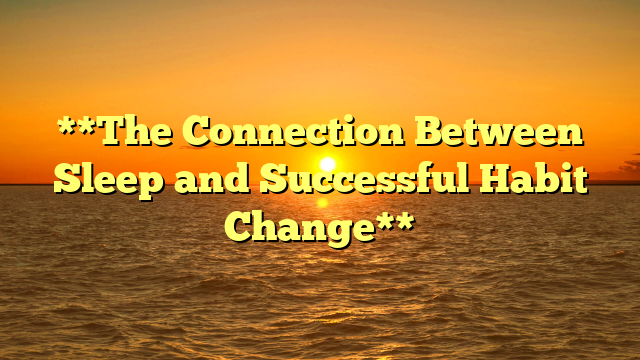
In the pursuit of personal growth and self-improvement, changing habits is often at the core of the journey. Whether it’s adopting a healthier lifestyle, improving productivity, or breaking bad habits, success depends on consistency and discipline. However, one critical factor that is often overlooked in this process is sleep. Sleep plays a vital role in our ability to form and maintain new habits, and understanding this connection can significantly enhance our chances of success.
The Science of Sleep and Habit Formation
Habit formation is deeply rooted in the brain’s neural pathways. When we repeat a behavior consistently, our brain creates and strengthens connections that make the behavior more automatic over time. This process relies heavily on the brain’s ability to learn, adapt, and consolidate memories—functions that are directly influenced by sleep.
During sleep, particularly during the deep stages of non-REM sleep, the brain processes and stores information from the day. This includes the behaviors and routines we are trying to adopt. Without adequate sleep, the brain struggles to solidify these new patterns, making it harder for habits to stick. Research has shown that sleep deprivation impairs cognitive functions such as attention, decision-making, and self-control—all of which are essential for successful habit change.
Sleep and Willpower
Willpower is a finite resource that depletes throughout the day. When we are sleep-deprived, our ability to resist temptations and stay focused on our goals diminishes. For example, someone trying to quit smoking or reduce sugar intake may find it much harder to resist cravings after a poor night’s sleep. This is because sleep deprivation lowers activity in the prefrontal cortex, the part of the brain responsible for self-regulation and impulse control.
On the other hand, getting enough sleep replenishes our willpower reserves, making it easier to stay committed to new habits. A well-rested mind is better equipped to handle challenges, make thoughtful decisions, and maintain the discipline required for long-term change.
Sleep and Emotional Resilience
Changing habits often involves overcoming setbacks and staying motivated despite obstacles. Sleep plays NS2121 – Situs Judi Online Terbaik in emotional regulation, helping us manage stress and maintain a positive outlook. Lack of sleep, on the other hand, can lead to increased irritability, anxiety, and frustration, which can derail our efforts to change.
For instance, someone trying to establish a regular exercise routine may feel discouraged after missing a workout. A well-rested individual is more likely to view this as a minor setback and recommit to their goal, while a sleep-deprived person may feel overwhelmed and give up altogether. By prioritizing sleep, we build the emotional resilience needed to navigate the ups and downs of habit change.
Practical Tips for Leveraging Sleep in Habit Change
1. **Prioritize Sleep Hygiene**: Create a sleep-friendly environment by keeping your bedroom dark, cool, and quiet. Avoid screens and stimulants like caffeine before bedtime.
2. **Establish a Consistent Sleep Schedule**: Going to bed and waking up at the same time every day helps regulate your body’s internal clock, improving the quality of your sleep.
3. **Use Sleep to Reinforce Habits**: Pair new habits with your existing sleep routine. For example, if you’re trying to meditate daily, do it right before bed to create a calming pre-sleep ritual.
4. **Track Your Progress**: Monitor both your sleep patterns and your habit-forming efforts. This can help you identify correlations and make adjustments as needed.
Sleep is not just a passive state of rest; it is an active participant in our ability to change and grow. By recognizing the connection between sleep and successful habit change, we can harness the power of rest to support our goals. Whether you’re trying to adopt healthier habits, break bad ones, or simply improve your overall well-being, prioritizing sleep is a simple yet transformative step toward success. Remember, a well-rested mind is a powerful ally in the journey of self-improvement.





